联合国教科文组织2019教育信息化奖开始提名了!人工智能应用项目申请看这里


GettyImages/Ridofranz
联合国教科文组织哈马德·本·伊萨·哈利法国王教育信息化奖现已开始提名。该奖项2019年的主题是利用人工智能发展教育、创新教学与学习方法。
人工智能(AI)和神经学的进步不仅为改进教学方法、支持终身和个性化学习提供了各种新的探索渠道,还有利于加速发现并推动新的教学模式。为实现可持续发展目标4(优质教育),教科文组织及其合作伙伴致力于通过发展高效且符合伦理的人工智能应用来优化教育供给和学习过程,提高学习成果。
今年该奖项将分别用于奖励杰出的人工智能解决方案及人工智能中的神经学应用,奖项的设置旨在提高学习成果、赋予教师权能、发展教育服务,同时提倡在教育中以包容、公平的态度使用人工智能。
教科文组织总干事将依照国际评审团的建议挑选2名获胜者。授奖仪式在巴黎举行,优胜者将获得相关证书及2.5万美元的奖励。
申请人要求
任何正在进行与今年奖项主题(利用人工智能发展教育、提高学习成果或为教师赋能)有关项目的个人、机构或非政府组织(NGO)都具备候选资格。
有关评选标准和候选人条件的详细信息
https://en.unesco.org/themes/ict-education/ict-education-prize/nomination
申请步骤
申请人应先注册账户
并通过在线平台填写报名表格
http://www.unesco.org/ict-ed-prize
详情请参阅用户指南及说明
https://en.unesco.org/themes/ict-education/ict-education-prize/nomination
申请人必须得到教科文组织会员国全国委员会或与教科文组织有正式合作关系的非政府组织的推选。
建议申请人在申请开始前与相关非政府组织或本国联合国教科文组织全国委员会取得联系。不接受自我推荐。
每个教科文组织成员国政府及与教科文组织有正式合作关系的非政府组织最多可推选3个候选人/机构。获推选项目应符合评选标准,并与2019年主题相符。
推选截止时间
2019年10月31日(巴黎时间午夜)
更多信息请联系
UNESCO ICT in Education Prize: call for nominations open to projects leveraging AI

The UNESCO King Hamad Bin Isa Al-Khalifa Prize for the use of ICT in education is now accepting candidatures. The theme of the 2019 edition is the use of Artificial Intelligence (AI) to innovate education, teaching and learning.
Artificial Intelligence (AI) and advancements in neuroscience have the potential to enhance teaching methodologies, support lifelong learning and personalize learning through various ways, as well as propel and accelerate the discovery of new delivering modes of education. Keeping in with Sustainable Development Goal 4 on education, UNESCO with its partners is aiming to explore the effective and ethical use of AI applications to reduce barriers to access education and optimize learning processes with a view to improve learning outcomes.
In 2019, the Prize will award AI-powered solutions as well as applications of neuroscience in AI aiming to improve learning outcomes, toempower teachers and toenhance the delivery of education services, whileadvocating for inclusive and equitable use of these technologies in education.
Two winners will be selected by the Director-General of UNESCO based on the recommendations of an international Jury, and each winner will receive a reward of US$ 25,000 and a diploma during a ceremony in Paris.
Who can apply?
Any individual, institution, or non-governmental organization (NGO) with an established ongoing project relevant to the specific theme of the year i.e. that uses AI-powered solutions to enhance education, improve learning outcomes or empower teachers.
More information on selection criteria and eligibility
https://en.unesco.org/themes/ict-education/ict-education-prize/nomination
How to apply?
First create an account and then
fill in an online form via the online platform
http://www.unesco.org/ict-ed-prize
See detailed user guide and instructions
https://en.unesco.org/themes/ict-education/ict-education-prize/nomination
For the application to be considered, it should be nominated by either the National Commission of the UNESCO Member State or an NGO in official partnership with UNESCO.
All applicants are encouraged to get in touch with the NGO or National Commission ahead of the application process. Self-nominations will not be accepted.
Governments of UNESCO Member States as well as NGOs in official partnership with UNESCO are invited to elicit and nominate up to three projects, which are in line with the 2019 theme and meet the selection criteria.
Deadline for nominations
31 October 2019 (midnight, Paris time)
Contact
![]()
小编整理了历年哈马德·本·伊萨·哈利法国王教育信息化(ICT)奖的获奖情况
2018
荷兰、芬兰项目获奖
The Use of ICTs to ensure education for excluded vulnerable groups.
Can’t Wait to Learn,CWTL"迫不及待去学习"—荷兰
荷兰国际性非政府组织荷兰战争儿童(War Child Holland)为冲突地区儿童研发了一款基于游戏的学习工具——"迫不及待去学习"(Can’t Wait to Learn,CWTL),该工具获得2018年度UNESCO哈马德·本·伊萨·哈利法国王教育信息化奖。
ThingLink visual learning technology——芬兰
来自芬兰的ThingLink visual learning technology,通过交互式图像、视频和360°媒体,创造独特的体验。
2017
印度、摩洛哥项目获奖
The Use of ICTs to Increase Access to Quality Education
联合国教科文组织总部将于2018年3月7日举行仪式,颁发2017年度联合国教科文组织哈马德·本·伊萨·哈利法国王教育创新奖。2017年度获奖者为印度CLIX项目和摩洛哥GENIE计划项目。
CLIX项目(关联学习计划项目)- 印度
CLIx (The Connected Learning Initiative), India
塔塔社会科学研究所开发的CLIX项目利用信息通信技术,提高社会服务不足的社区学生接受中学和高等教育的机会。它以3种语言(印地语、泰卢固语和英语)提供高质量的基于平台的混合学习体验。迄今为止,该计划已惠及印度4个邦的478所政府高中,共计1767名教师和46420名学生。
GENIE计划 - 摩洛哥 GENIE, Morocco
GENIE计划于2005年启动,是由摩洛哥教育和职业培训部与高等教育和科学研究部共同制定并实施的一项大规模、长期国家政策和倡议,旨在纳入信息通信技术,以改善中小学教育的普及和质量。项目包括有效的国家信息通信技术教育应用政策的核心元素,如基础设施、教师培训、数字资源开发和教学实践改革等。项目为超过1万所学校提供基础设施、数字设备和互联网连接,并通过向全国30多万教师和学校管理人员提供在职培训,推动教学创新。本项目的大力实施使该国学校教育比例已提高至95%,辍学率下降53%。
2016
德国、孟加拉国项目获奖
The Use of ICTs in Education for Disadvantaged Groups
“Harnessing the Power of ICTs in Higher Education for Refugees” of Kiron Open Higher Education (Germany)
The project contributes to overpass the four challenges identified by the UNHCR Commissioner for Higher Education for refugees to access higher education: legal, financial, language barriers and colleges capacities. Kiron focuses on refugees, asylum seekers and internally displaced people in Germany, France, Belgium, Turkey and Jordan. 2,700 students have been benefiting of the program in partnership with 51 universities. It enables access to higher education through digital solutions. Kiron proposes an online phase harnessing the potential of Massive Open Online Courses (MOOCs) followed by an offline phase when students study in one university and graduate with an accredited university degree. Furthermore, the project also provides a coaching service with a psycho-social support and a personalized curricula.
“Online School” of Jaago Foundation (Bangladesh)
总部设在达卡的加哥(JAAGO)基金会 (link is external)是由孟加拉国的一群年轻人发起成立的,JAAGO在孟加拉语里是“唤醒”的意思,这个基金会旨在为最偏远地区的孩子提供优质教育,打破贫穷的恶性循环。2011年,他们想出了一个非常简单的解决方案:通过视频会议技术和互联网把乡村教室与首都地区的优秀教师连接起来。项目最初仅仅覆盖了80名学生,但很快他们就得到了孟加拉国最大的电信运营商GrameenPhone Ltd 的合作和支持,开办了10所线上学校,这个基金会还运作着一些常规学校,为13所学校的18,000名学生和一所孤儿院提供免费的国际化水准教育。
2015
哥斯达黎加、新加坡项目获奖
Pedagogical Innovation in the Use of ICTs in Teaching and Learning
“National Program of Educational Informatics” (PRONIE) of the Omar Dengo Foundation (Costa Rica)
The project contributes to improving the quality and equity of learning opportunities within the public education system through the use of digital technologies. It gives priority to marginalized children and youth from rural and marginal urban areas. Since 1988, 8,674,521 students have benefited from the program in pre-schools, primary schools, secondary schools and TVET schools. The program PRONIE has developed an outstanding systematic approach to enhance students’ capacities to create ICT products across the school system. Furthermore, the program also focuses on teachers’ continuous training and monitoring to improve their teaching skills in educational informatics.
“Open Source Physics@Singapore (link sends e-mail)” project of the Ministry of Education of the Republic of Singapore
The project is rewarded for its project. The project has been developed by the Educational Technology Division of the Ministry of Education since 2012. Its goal is to give users, including students and teachers, the freedom to learn from, build on and share well designed ICT resources for teaching and learning physics. An outstanding innovative tool, “Open Source Physics@Singapore (link sends e-mail)” for learning physics using an open platform, including open source code and open content, was developed. Both students and teachers work in a collaborative and innovative way, benefiting from the adaptable resources that it provides for better learning and teaching. So far, 9,800 students have been reached by the program in primary, secondary and TVET schools. In addition, the software application enhanced collaboration between the educational community, the Ministry and industry. It is easily scalable to a larger community as the tools and content are available worldwide.
2011
德国、韩国项目获奖
Education Youth for Responsible Global Citizenship
Internet-ABC, Germany
Internet-ABC offers children, parents and educators support and information on how to handle the web safely. The content is ad-free, safe and easily accessible to everyone. Attractive and engaging sites invite 5-12-year-old children to play, learn and communicate, while reinforcing their knowledge of safe Internet use. The www.internet-abc.de (link is external) website attracts 100,000 users per month on average.
Dr Yuhyun Park, Co-Founder and CEO of iZ HERO, Republic of Korea
iZ HERO is a digital leadership initiative that empowers 6-12-year-old children to become future leaders in the digital era by fostering essential skills and value-based digital citizenship. This international research-driven, award-winning programme includes a holistic online play-and-learn tool and a suite of offline programmes. It has demonstrated educational efficacy in improving children’s attitudes toward Internet risks such as cyber bullying, game addiction and online predators through academic research. To date, over 1.5 million people have visited the iZ HERO Exhibition at the Singapore Science Centre and around 70 per cent of primary schools and target students in Singapore have participated in the iZ HERO initiative.
2010
英国、委内瑞拉项目获奖
Digital Literacy: Preparing Adult Learners for Lifelong Learning and Flexible Employment
National Institute of Continuing Adult Education (NIACE), United Kingdom
NIACE is the leading non-governmental body promoting the interests of adult learners in England and Wales. NIACE is a membership organization with paid staff, including a specialist Digital Learning Team. Its work draws on both theoretical and practical knowledge of the methods and pedagogies which work best in offering learning opportunities to adults. It has developed a national network of 6,000 Internet access centres to serve adults in both rural and urban areas.
Venezuelan Fundación Infocentro, Bolivarian Republic of Venezuela
The “Technological Literacy for Older Adults” project was submitted by the Infocentro Foundation. Following its own “Pedagogy of Patience” philosophy, facilitators of the Infocentros network have experience and expertise in working with the elderly. They use a variety of strategies, techniques and resources and adapt educational practices to older users to help them overcome their technological fears and familiarize themselves with computers. Some 680 Infocentros across the country enable adults and other users to achieve lifelong learning, and have helped more than 900,000 people at national level achieve technological literacy.
2009
俄罗斯、约旦项目获奖
Teaching, learning and e-Pedagogy: Teacher Professional Development for Knowledge Societies
Alexei Semenov, Rector of the Moscow Institute of Open Education, Russian Federation
Teacher professional development is the major mission of the Moscow Institute of Open Education (MIOE), led by Professor Alexei Semenov. Every year, the Institute organizes dedicated e-pedagogy development for 5,000 to 10,000 teachers and introductory modules for 30,000 teachers with extensive web-based content and technologies.
Jordan Education Initiative, Jordan
The Jordan Education Initiative (JEI) is one of Her Majesty Queen Rania Al Abdullah’s non-profit organizations which works with the Ministry of Education to drive innovation by leveraging private-sector participation. JEI was created as a pioneer model for developing education, based on fostering ingenuity, harnessing the power of technology and coupling it with proven modern teaching strategies to transform the school environment into a cradle of discovery and creativity and allow Jordanian students to imagine and realize a future reality. Since its launch in 2003, JEI has impacted the lives of thousands and made a very tangible positive impact on students, teachers, families, communities and the economy.
2008
中国、埃及项目获奖
Digital Opportunities for All: Preparing Students for 21st Century Skills
上海电视大学凭借“市民数字化终身学习系统建设”项目
Shanghai TV University, People's Republic of China
在2008年度的奖项评选中,中国上海电视大学凭借“市民数字化终身学习系统建设”项目,在联合国教科文组织47个成员申报的67个项目中脱颖而出。联合国教科文组织总干事松浦晃一郎说,上海电视大学运用卫星技术,将学习网络覆盖到全市230个社区学习中心,取得了良好的社会效果。他还特别称赞学校向边远地区以及非洲一些发展中国家提供远程教育服务的做法。
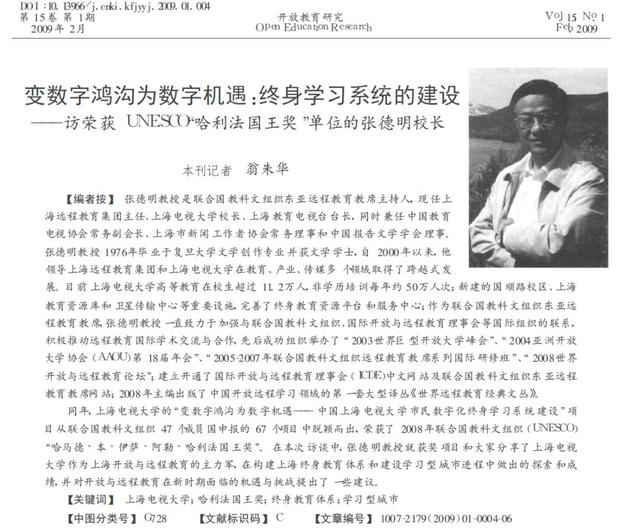
Dr Hoda Baraka, First Deputy to the Minister of Communications and Information Technology, EgyptThe comprehensive “ICT-In-Education Programme: Towards Ubiquitous Reachability to All Learners” was started in the Ministry of Communications and Information Technology (MCIT) in 2003 to reach out to learners through formal and informal educational practices in schools and universities, as well as non-formal education streams of systematic educational activities outside schools and universities. This project was developed by Dr Huda Baraka, First Deputy to the Minister of Communications and Information Technology. She has led the implementation of many national projects for the use of information and communication technologies in the field of education.
2007
美国、比利时项目获奖
Open Education
Curriki, United States of America
Curriki’s driving mission is to make education more equitable through a global open educational resource (OER) community of educators, parents and students, enabling teachers to make learning more personalized and helping students reach their full potential. The online community gives teachers, students and parents universal access to a wealth of peer-reviewed “K-12” (kindergarten to 12th grade) curricula and powerful online collaboration tools. Curriki built the first website for open instruction and assessment. Founded by Sun Microsystems in 2004, the organization has operated as an independent non-profit organization since 2007.
Claroline Connect, Belgium
Claroline Consortium has implemented an e-learning and e-working platform (learning management system) released under an open-source GNU General Public License (GPL). It is a platform for distance training and collaborative work. Translated into 35 languages, Claroline allows hundreds of institutions from 93 countries to create free online courses.
Adaptable to different trainings, Claroline has been developed according to teachers’ pedagogical experiences and needs. It supports course managers in their projects and stimulates them to set up efficient resources promoting the acquisition of knowledge and skills.
2006
韩国、芬兰项目获奖
Enhancing Teaching and Learning
The Cyber Home Learning System (CHLS) for primary and secondary students, the Korean Ministry of Education and Human Resources Development (MOEHRD) and the Korea Education and Research Information Service (KERIS), Republic of Korea
The Korea Education and Research Information Service (KERIS) was established in 1999 as an exclusive national institute to promote the effective use of information and communication technologies (ICTs) in education. The Cyber Home Learning System is a nation-wide e-learning system aiming to provide elementary and secondary school students in Korea with a quality education service after school hours. It has helped reduce private tutoring expenses, enhance the quality of public education, and achieve equity in education and education welfare by narrowing the education gap between regions and income levels.
来源:联合国教科文组织微信公众号
点击阅读原文登陆网站获取更多信息
延伸阅读
联合国教科文组织发布《教育中的人工智能:可持续发展的机遇和挑战》(附英文版)
以人工智能促进可持续发展 | CIT主任黄荣怀教授出席联合国教科文组织移动学习周(附报告PPT)
人工智能促进可持续发展 | 联合国教科文组织“移动学习周”正在进行
干货 | 中英对照的人工智能术语表,来自联合国教科文组织
长按二维码,关注公众号





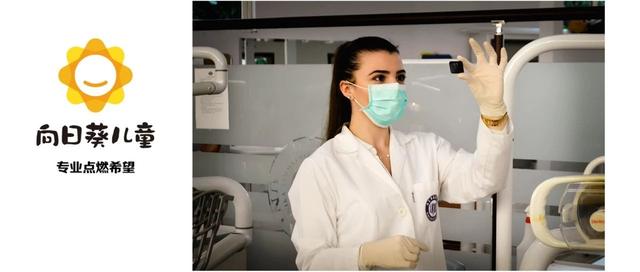

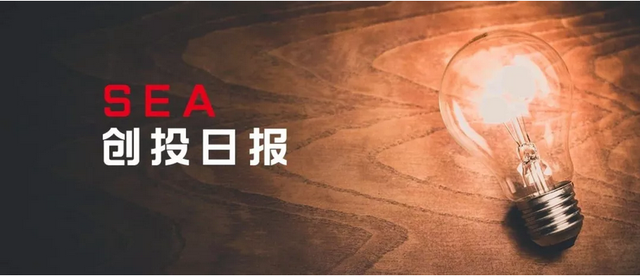

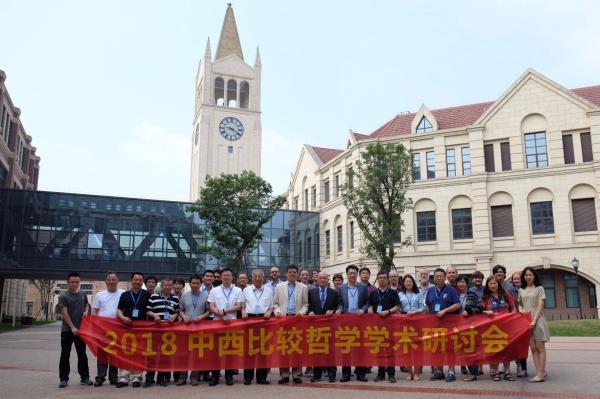
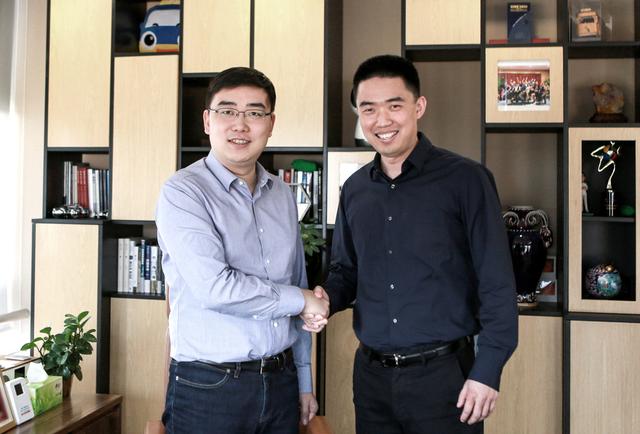










评论